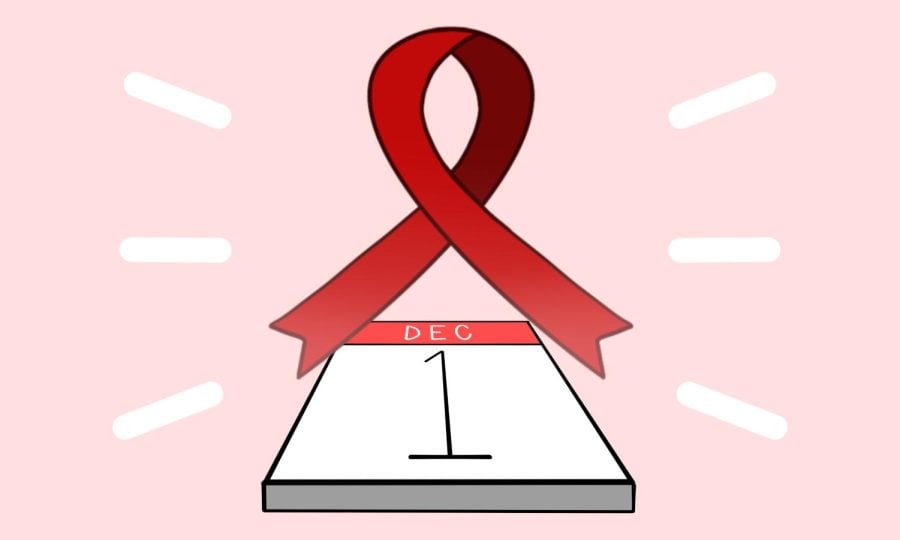Two epidemics later, community members reflect on the 34th World AIDS Day
Illustration by Olivia Abeyta.
Since 1988, World AIDS Day has been a time to honor those who died of AIDS or are currently living with HIV/AIDS.
December 1, 2022
In a time of recovery and grieving from the COVID-19 pandemic and mpox outbreak, the 34th annual World AIDS Day renews questions about rising anti-LGBTQ+ sentiments and inequitable aid distribution.
Since 1988, Dec. 1 has been observed as a day to honor those who have died of AIDS and demonstrate solidarity with those living with HIV/AIDS.
An estimated 38 million people globally are currently living with HIV, and last year around 650,000 died of related causes, according to the Joint United Nations Programme on HIV/AIDS. With wider treatment distribution and fewer new infections, these statistics have fallen in the United States in recent decades. However, Black and Latine people are still disproportionately impacted by the disease.
Since the majority of HIV/AIDS cases appear overseas, the issue may seem less visible to some in the U.S., according to global health studies Prof. Sokhieng Au.
“I think in the U.S., people just don’t see it as a U.S. problem anymore,” Au said. “There’s about a million people in the U.S. who have HIV/AIDS, so it’s not a small number.”
Other diseases clouding the health field in the U.S. have also contributed to decreasing HIV/AIDS visibility in recent years.
However, the May outbreak of mpox has brought AIDS back into the national conversation, especially since disease has primarily impacted men who have sex with men.
“I think it was extremely traumatizing for gay men and queer men to have this happen again,” said Medill Prof. Steven Thrasher.
The skin rashes caused by mpox are reminiscent of the lesions seen in early cases of AIDS, Thrasher said.
Though the severity of the diseases differ, both have been stigmatized, Au added.
“When you’re afraid, you want…to blame something external to yourself,” Au said. “And that particular group that’s already marginalized — that’s already politically disenfranchised, that already kind of lacks those levers of power (and) can’t access that kind of social capital — is very convenient.”
Since mpox was contained relatively quickly, marginalized groups were not scapegoated as extensively as past epidemics, according to Mike Mazzeo, treasurer for the board of directors at Howard Brown Health.
Still, some criticized the news coverage and conversation about mpox as alarmist when the first cases surfaced.
“Of the thousands of things you could hold against someone, the fact that they are sick, that they need healthcare, seems like the worst possible thing to attack someone for,” Mazzeo said.
Like AIDS, mpox has physically outed some men as homosexual with its physical indicators. If not rashes on their skin, standing in line for vaccination can create potentially unwanted visibility, Thrasher said.
Though the U.S. has made significantly advanced LGBTQ+ rights since the first World AIDS Day, both Mazzeo and Thrasher said complete safety or acceptance is still not guaranteed for all LGBTQ+ individuals.
“It was a tough summer for LGBT communities in a lot of different ways,” Mazzeo said.
One of the ongoing obstacles for LGBTQ+ people, Mazzeo added, has been legislation targeting transgender youth and access to gender affirming healthcare.
Amid the ongoing COVID-19 pandemic and the mpox outbreak, Thrasher said many people have yet to find time to grieve and process their trauma.
“(Mpox) was a legitimate grief for a lot of people,” Thrasher said, “to not only embrace celibacy and live in fear for a while, but also the grief that brought up for other people triggering their own AIDS losses.”
Email: lexigoldstein2026@u.northwestern.edu
Twitter: @lexipgoldstein
Related Stories:
— Professors break down racial and LGBTQ+ health disparities in forum
— Northwestern faculty talk monkeypox risk factors at LGBTQ+-focused discussion
— Northwestern and Evanston partner to offer two monkeypox vaccine clinics


